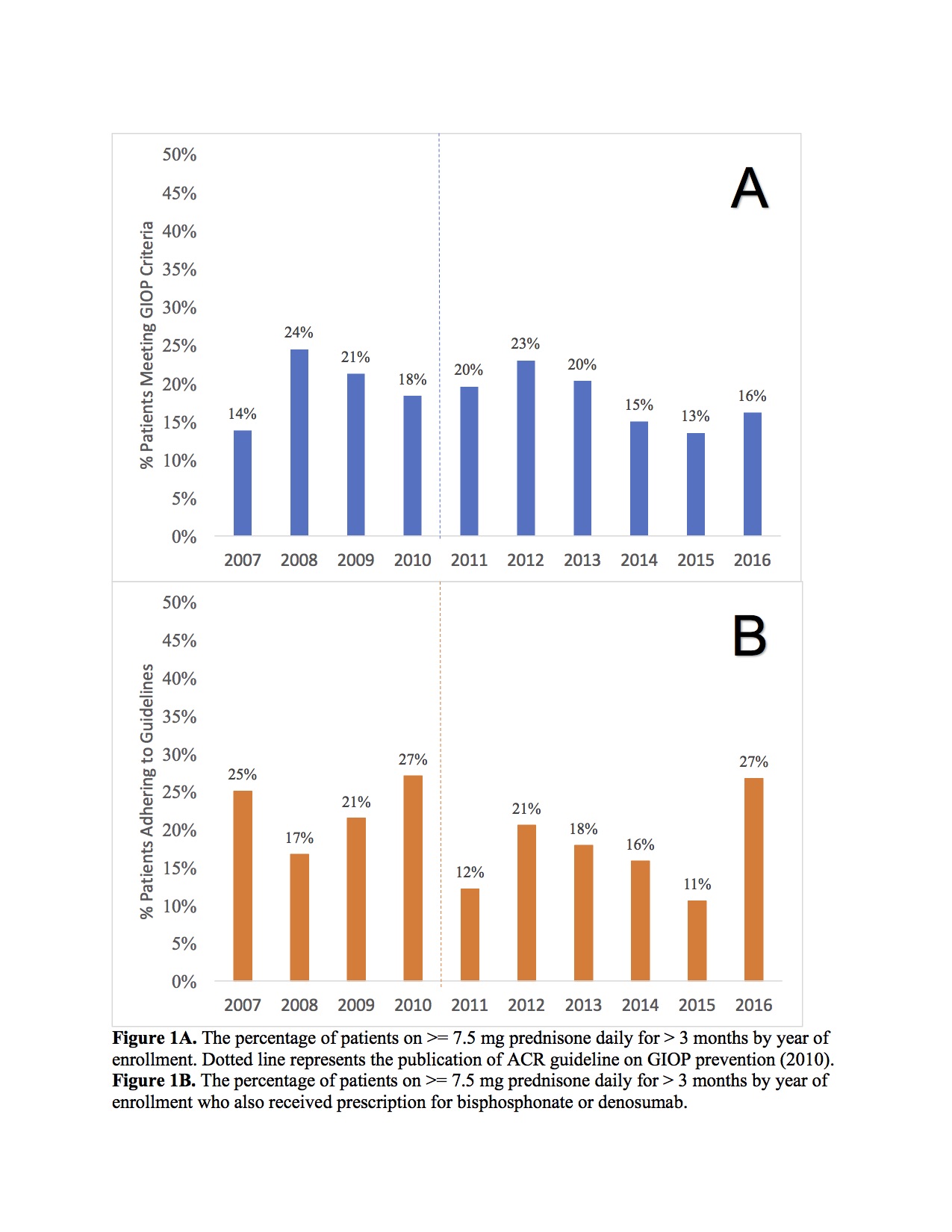Session Information
Date: Tuesday, November 7, 2017
Title: Rheumatoid Arthritis – Clinical Aspects Poster III: Comorbidities
Session Type: ACR Poster Session C
Session Time: 9:00AM-11:00AM
Background/Purpose:
RA patients are at a high risk of osteoporosis and fracture, in part due to frequent glucocorticoid use. Despite recommendations from ACR guidelines on prevention of glucocorticoid-induced osteoporosis (GIOP), use of anti-osteoporotic medication (AOM) in RA patients remains low. The current study aimed to analyze trends in AOM use over the past 10 years among early RA patients meeting guidelines for GIOP prevention, and to examine predictors of guideline adherence among this population.
Methods:
Data were obtained from a multi-center prospective cohort study of early RA patients. This analysis included participants over age 50, without a diagnosis of osteoporosis at baseline, with at least 6 months of follow up. GIOP guideline adherence was determined based on use of bisphosphonate or denosumab in patients receiving >= 7.5 mg prednisone daily for > 3 months. Logistic regression was used to determine predictors of guideline adherence adjusting for age, gender, ethnicity, comorbidities, BMI, average glucocorticoid dose, and baseline DAS28-ESR.
Results:
1468 patients were included with mean age 63 (9), 933 (64%) were female, and mean (sd) DAS28-ESR was 5.0 (1.4). 282 (19%) patients received >= 7.5 mg prednisone daily for > 3 months, and this number decreased over time (Figure 1A). Overall, only 54 (19%) eligible patients received AOM (Figure 1B), and 105 (37%) received Vitamin D. Chi square analyses showed a significantly higher likelihood of AOM and Vitamin D use in patients on chronic glucocorticoids. In logistic regression analyses, baseline DAS28 significantly predicted guideline adherence, while BMI and glucocorticoid dose showed trends towards significance.
Conclusion:
In this national early RA cohort, approximately 1 in 5 patients met criteria for GIOP prevention according to ACR guidelines. Chronic use of glucocorticoids did decrease over time, suggesting either less frequent use or faster tapering. Adherence to GIOP prevention guidelines was suboptimal and did not change over time. Higher disease activity was significantly associated with guideline adherence. Further research is needed to determine reasons for guideline nonadherence and to develop strategies to improve prevention of GIOP.
To cite this abstract in AMA style:
Gottheil S, Schieir O, Thorne C, Hitchon CA, Tin D, Keystone EC, Boire G, Haraoui B, Bartlett SJ, Bykerk VP, Pope JE. Trends and Predictors of Guideline Adherence for Glucocorticoid-Induced Osteoporosis Prevention in an Early Rheumatoid Arthritis Cohort [abstract]. Arthritis Rheumatol. 2017; 69 (suppl 10). https://acrabstracts.org/abstract/trends-and-predictors-of-guideline-adherence-for-glucocorticoid-induced-osteoporosis-prevention-in-an-early-rheumatoid-arthritis-cohort/. Accessed .« Back to 2017 ACR/ARHP Annual Meeting
ACR Meeting Abstracts - https://acrabstracts.org/abstract/trends-and-predictors-of-guideline-adherence-for-glucocorticoid-induced-osteoporosis-prevention-in-an-early-rheumatoid-arthritis-cohort/

